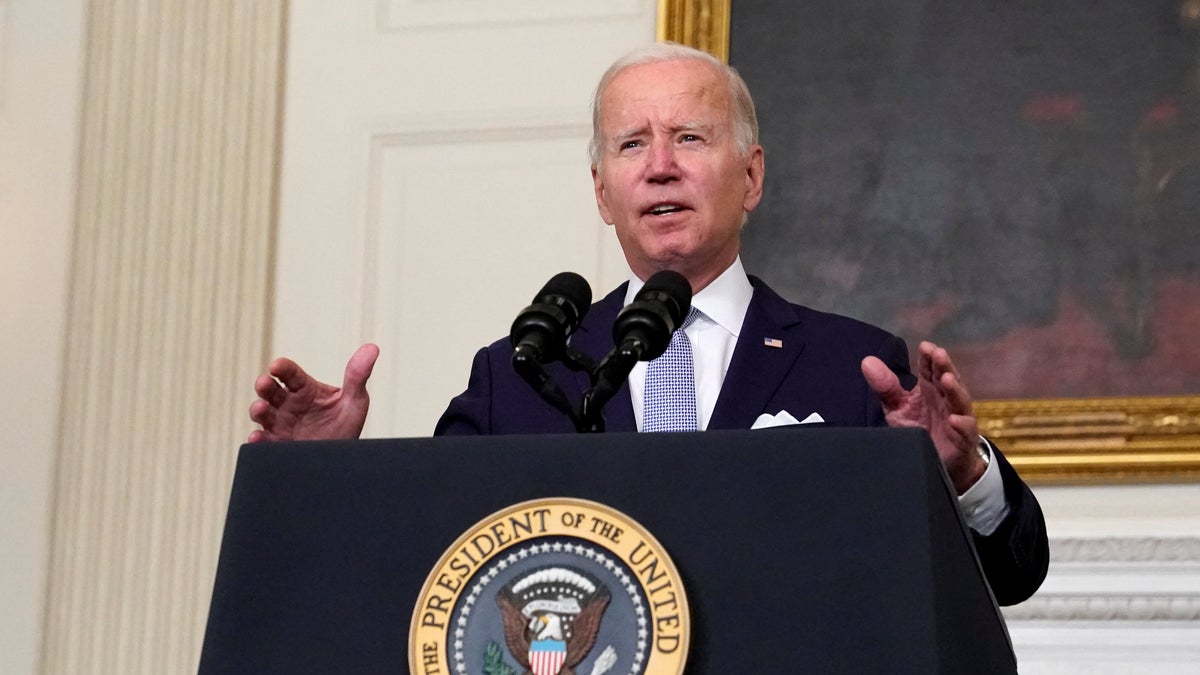Democrats' inflation bill has 'devastating consequences': Heritage Foundation president
Heritage Foundation President Kevin Roberts says Sens. Manchin, Sinema and the Biden administration are trying to be 'cute' with their rhetoric for supporting the Inflation Reduction Act.
New York Times columnist Paul Krugman argued Thursday that claims the Democratic-supported Inflation Reduction Act would raise middle-class taxes were "bogus."
Krugman and other liberals have celebrated the legislation, which appears poised to pass with Democratic Sens. Kyrsten Sinema, D-Ariz., and Joe Manchin, D-W.Va., on board, as a meaningful step to battle climate change while only hiking costs on corporations and the wealthy. Republicans, however, have said the climate and health care package would raise taxes across all brackets, citing a study from the Joint Committee on Taxation.
"How can Republicans attack such a bill?" Krugman wrote. "They can’t openly defend the interests of tax evaders and avoiders, although their long-term efforts to starve the I.R.S. of resources show that in practice they are pro-tax cheater. What they have done, instead, is claim — citing an estimate from Congress’s nonpartisan Joint Committee on Taxation — that the legislation would raise taxes on the middle class and that this violates one of Joe Biden’s campaign pledges. It’s a bogus claim, on multiple levels."
Krugman said the bill – which is expected to spend $433 billion total, and raise $739 billion in tax revenue, according to Democrats – won't raise personal income taxes on anyone. Krugman recently acknowledged he made a "very bad call" last year when the reliably pro-Democratic columnist downplayed fears of lengthy, damaging inflation.

POCANTICO HILLS, NY - OCTOBER 21: Nobel Prize-winning economist and New York Times Opinion columnist Paul Krugman attends The New York Times Food For Tomorrow Conference 2015 at Stone Barns Center for Food & Agriculture on October 21, 2015 in Pocantico Hills City. (Photo by Neilson Barnard/Getty Images for the New York Times)
"What the J.C.T. projects instead are ‘distributional effects,’ an attempt to estimate the indirect burden on families resulting from other taxes, which in this case essentially means the possible effect on wages of requiring large corporations to pay a minimal amount of tax," he wrote. "Estimating these effects is useful, but are they a ‘tax increase’ on workers? Almost any government policy will have an adverse effect on the income of someone, somewhere; is everything the government does a tax increase?"
PolitiFact did a fact-check of a similar claim that the legislation would hike taxes, writing, "The critics have a point in saying that the Joint Committee on Taxation analysis found higher taxes, on average, in every income bracket." Republicans have said the bill will hurt the economy and middle class families right as the United States has entered a recession, citing JCT data that shows nearly every income bracket will feel the burden of the new taxes, if indirectly. And they say that the taxes will harm manufacturers disproportionately, just after Congress passed legislation aimed at boosting U.S. semiconductor chip manufacturing.
According to the JCT, Americans making less than $10,000 per year would see a 0.3% tax hike starting in 2023. Overall, starting in 2023, taxes would increase by $16.7 billion for Americans earning less than $200,000. For taxpayers earning between $200,000 and $500,000, the bill would increase taxes cumulatively by $14.1 billion.
"Overall, the federal tax burden for all Americans would rise by 1.4%. For those earning between $30,000 and $100,000, the increase would be less than 1%; for those earning less or more, the increase would exceed 1%," PolitiFact's Louis Jacobson wrote.

U.S. President Joe Biden gestures as he delivers remarks on the Inflation Reduction Act of 2022 at the White House in Washington, U.S., July 28, 2022. REUTERS/Elizabeth Frantz
STRATEGISTS, TAX EXPERTS WEIGH IMPLICATIONS OF MANCHIN-BACKED BILL ON MIDTERM ELECTIONS
He cited "independent experts" who felt the bill's provisions would cancel out any indirect costs passed on to Americans, such as continued health insurance subsidies under the Affordable Care Act, as well as subsidies for clean energy like tax credits for buying electric cars and companies that use renewable energy.
The legislation includes provisions on fossil fuel energy, climate and green energy, prescription drugs, the Affordable Care Act and the tax code. Republicans are expected to unanimously oppose it.
President Biden has repeatedly said the bill won't raise taxes on those making less than $400,000; any hike on middle-class families would violate a major campaign pledge.
Krugman tweeted he was feeling "cheerful" as a result of the GOP's line on the bill, but he also felt good because of an excellent jobs report.
Krugman and others who have said the U.S. is not in a recession took a victory lap after Friday's numbers showed the economy added 528,000 jobs in July, shattering expectations. The Biden administration and supporters in the media have repeatedly said that despite the U.S. going through consecutive quarters of economic contraction, the country is not a recession due to other factors, including continued job growth.

NEW YORK, NEW YORK - JULY 26: A woman picks food in a fresh market on July 26, 2022 in New York. Food prices in the New York area have jumped more than 9% in the last year, is the steepest in the last 40 years, according to the BLS. Inflation is hitting poor and working-class New Yorkers, immigrants and the food pantries that support them. (Photo by John Smith/VIEWpress)
Several outlets and reporters, however, previously accepted that definition.
"The strong jobs report was welcome news for President Biden, who has insisted in recent weeks that the United States is not in recession, even though it has suffered two consecutive quarters of economic contraction," the New York Times reported on Friday.
It noted the numbers surprised even White House officials, who "prepped reporters this week for the possibility that job growth was cooling, in line with Mr. Biden’s expectations."
CLICK HERE TO GET THE FOX NEWS APP
Fox News' Tyler Olson and Paik contributed to this report.





















